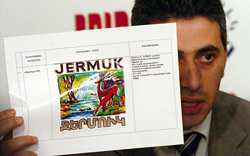Water has always been a particular phenomenon for Armenia, starting with the Great Flood and ending with the vision of maintaining the country by water sales. It seemed as though Armenians had understood that you can’t keep a nation by selling water. However, we did make attempts. True, there were only two families getting profit from water exports, but that did not impede us Armenians to feel a sense of pride. Then, suddenly some countries banned the import of “Jermuk”. People went into chaos and now we have press conferences every day. The U.S. Food and Drug Administration had clearly stated the reason: there is arsenic in “Jermuk”. Armenians got confused. None of the Armenian experts denies this. In fact, deputy head of the inspectorate of the Ministry of Health M. Basilisyan published an exclusive explanation.
It turns out that the 500-600 micrograms of arsenic found by the Americans is much less than the standard amount used in Armenia. We allow ourselves to drink mineral water consisting of 100-200 more micrograms; in fact, those fancy foreigners have come up with classifications when they don’t even have normal drinking water. It turns out that not only are their toothbrushes and shoe brushes different from one another, but also water. We are the nation with the best water, yet whereas we have not classified water as “drinking”, “table” or “medicinal”, they have. Now, when we give them medicinal water and call it clear water, they refuse to drink it. Everyone in Armenia, even doctors, has forgotten that decades ago we were minute like the foreigners. At the time, mineral water was not sold in stores, rather pharmacies. Then that water was transferred to the chain of mineral waters based on Soviet standards. We forget all of this and try to convince the world that you can use mineral water as normal, drinking water. Nearly 8-9 years ago, there were mainly two companies producing “Jermuk” mineral water in the domestic market-“Mayr Gortsaran” and “Jermuk Group”. The foreign owners of “Mayr Gortsaran” (Janik Oskanyan, Kaytsak Zeytlyan) had appealed to the Government of Armenia, asking the government to provide them with a monopoly for “Jermuk” exports. The well-known Armenian-Diasporan businessmen explained the motives of their appeal by the following: it is impossible to sell “Jermuk” with these ingredients in the Western market. They claimed that additional equipment must be imported from abroad and “discharge” the chemical ingredients of that mineral water in order to sell it in developed countries. They believed that their investments would seem meaningless without getting the monopolization right because any Armenian “Jermuk” producing company could enter the market after paying the expenses to enter the Western market with its low-quality products and what would happen is what we see happening today. The Armenian-Diasporans had imported part of the equipment; they even started an experimental production-the new water made its way to the domestic market under the name “Jermuk-Light”. Then the Armenian-Diasporans did not get the monopoly and this attempt was failed. In fact, nearly 40 companies were licensed to fill water under the name “Jermuk”. It is not clear who was filling what and where he was selling that water.
This is not that horrible in a mountainous land like Armenia. We Armenians have drunk the cold water of our highlands for centuries and it has never crossed our minds that that water differs from the water of Volga or the Danube with its ingredients. The people from the lowlands have cleared the waters of their rivers as much as possible and drunk it. This has never been of concern to us because we have never had a level of urbanization hazardous to the environment and have had rivers. We have drunk the water of those rivers without ever thinking that it consists of salt, metals and other chemical substances. We still drink that water and we are one of the nations that live the longest in the world. Armenian experts are amazed at other experts as they bring up this argument. But those other experts are used to drinking other kinds of water. They will most definitely enjoy hearing what our experts have to say. There are political explanations-considering the ban on imports of “Jermuk” as economic pressure on Armenia. Mineral water producers don’t really pay that many taxes to the state; all the mineral water-producing companies put together only pay half a million dollars in taxes. So, hurting their business won’t really have an impact on the state budget. There are, of course, more startling announcements. For example, adviser to the president of “Jermuk Group” joint-stock company Edgar Ghazaryan told journalists that “the announcement dispersed by the U.S. Food and Drug Administration was done on purpose in order to stop the imports of all mineral waters of Armenia to the U.S. market”. So, just as we were making the vision of keeping a nation with water a reality, everything stopped and it stopped due to bad competition-“one of the marketers makes an agreement with any state body or organization, spreads a message and hurts the reputation of the market and the economic subjects”. We may suppose that Armenian mineral water was already sold in all American markets and gas stations and was already a serious competitor for the U.S. to begin the fight against water sales. We can only be surprised at how the taxing bodies only taxed 100 million drams from “Jermuk Group” last year when the company has such a large production. I think that this scandal serves as a good occasion for the taxing bodies to conduct some research.

